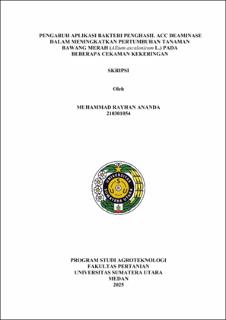| dc.description.abstract | This study aims to examine the effect of applying ACC deaminase-producing bacteria on enhancing the growth of shallot plants (Allium ascalonicum L.) under various drought stress conditions. The research was conducted in a greenhouse and analyzed at the Soil Chemistry and Biology Laboratory, Faculty of Agriculture, Universitas Sumatera Utara, and the Agricultural Instrument Standardization Agency (BSIP) Laboratory, Medan, from October 2024 to March 2025. The study used a Randomized Block Design with two treatment factors and three replications. The first factor was ACC deaminase-producing bacteria, consisting of four treatments: no bacterial application (B0), Achromobacter xyloxidans (B1), Burkholderia gladioli (B2), and Enterobacter sichuanensis (B3). The second factor was irrigation based on field capacity, comprising three levels: 45% field capacity (K1), 35% field capacity (K2), and 25% field capacity (K3). Observed parameters included soil pH (H₂O), total soil microbial population, soil respiration, plant height, leaf count, shoot fresh weight, root fresh weight, bulb fresh weight, and bulb count. The results showed that the application of ACC deaminase-producing bacteria significantly affects total soil microbial population, soil respiration, plant height, and fresh bulb weight. The best treatment was observed with the application of Burkholderia gladioli bacteria. Different levels of drought stress significantly influenced total soil microbial population, soil respiration, plant height, number of leaves, fresh shoot weight, fresh bulb weight, and number of bulbs. The application of ACC deaminase-producing bacteria has not yet been able to enhance the growth of shallot plants under various levels of drought stress (field capacity at 45%, 35%, and 25%). | en_US |


